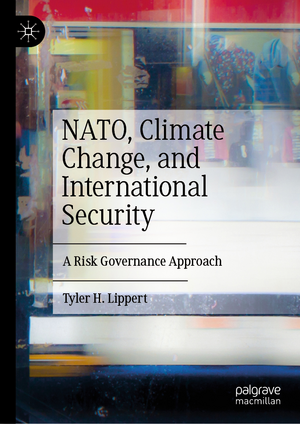NATO, Climate Change, and International Security: A Risk Governance Approach
Autor Tyler H. Lipperten Limba Engleză Hardback – 22 mai 2019
This book offers a prospective analysis of the anticipated security consequences of climate change in relation to the North Atlantic Treaty Organization (NATO). Using climate and security literature to complement recent foresight and scenario analysis developed by NATO, the author applies the International Risk Governance Council’s (IRGC) Risk Governance Framework to identify the considerations and actions that could assist NATO in a context where climate and environmental factors more intensively shape security. Tyler Lippert explores how climate change has the potential to increase the need for humanitarian assistance and disaster response, to create tension over shared resources, to renew and enhance geo-political interest in the Arctic, and to deepen concern with respect to the Middle East and North Africa (MENA). Within this new political and environmental reality, NATO must consider how to adapt to meet new demands, prepare for new security challenges, as well as manageunforeseen consequences.
Offering a corrective, this book identifies near-term actions for NATO to improve its risk governance posture, providing a basis upon which longer-range policy considerations can be developed. This analysis is only the opening salvo of what is likely to be a complicated process that spans many years, if not decades. However, in mapping the risk governance dimensions to the security and climate nexus from the perspective of NATO, Lippert provides a foundation for risk-based policy planning for NATO. The book will be of immense value to policy and decision makers: NATO leadership and its affiliated organizations as well as to academics across a broad span of subject areas, particularly environmental sociology, defense and foreign policy, and the political sciences.
Preț: 505.43 lei
Preț vechi: 549.38 lei
-8% Nou
Puncte Express: 758
Preț estimativ în valută:
96.73€ • 99.92$ • 80.50£
96.73€ • 99.92$ • 80.50£
Carte disponibilă
Livrare economică 28 februarie-06 martie
Livrare express 18-22 februarie pentru 61.30 lei
Preluare comenzi: 021 569.72.76
Specificații
ISBN-13: 9783030145590
ISBN-10: 303014559X
Pagini: 366
Ilustrații: VI, 263 p. 1 illus.
Dimensiuni: 148 x 210 mm
Greutate: 0.47 kg
Ediția:1st ed. 2019
Editura: Springer International Publishing
Colecția Palgrave Macmillan
Locul publicării:Cham, Switzerland
ISBN-10: 303014559X
Pagini: 366
Ilustrații: VI, 263 p. 1 illus.
Dimensiuni: 148 x 210 mm
Greutate: 0.47 kg
Ediția:1st ed. 2019
Editura: Springer International Publishing
Colecția Palgrave Macmillan
Locul publicării:Cham, Switzerland
Cuprins
Chapter 1: Introduction.- Chapter 2: Literature Review.- Chapter 3: Taking Stock of the Situation: NATO.- Chapter 4: Methodology & Context.- Chapter 5: A Risk Governance Case Study.- Chapter 6: Major Findings.
Notă biografică
Tyler H. Lippert earned a Ph.D. from the RAND Graduate School in Santa Monica, California, USA where he conducted policy research and analysis for RAND Corporation. He also holds a J.D. from Northwestern University School of Law, USA. Tyler served as the Editor in Chief of the Northwestern Journal of International Law & Business, and served in a variety of roles throughout Africa, the Middle East, and Europe, and on multiple occasions with the North Atlantic Treaty Organization (NATO).
Textul de pe ultima copertă
This book offers a prospective analysis of the anticipated security consequences of climate change in relation to the North Atlantic Treaty Organization (NATO). Using climate and security literature to complement recent foresight and scenario analysis developed by NATO, the author applies the International Risk Governance Council’s (IRGC) Risk Governance Framework to identify the considerations and actions that could assist NATO in a context where climate and environmental factors more intensively shape security. Tyler Lippert explores how climate change has the potential to increase the need for humanitarian assistance and disaster response, to create tension over shared resources, to renew and enhance geo-political interest in the Arctic, and to deepen concern with respect to the Middle East and North Africa (MENA). Within this new political and environmental reality, NATO must consider how to adapt to meet new demands, prepare for new security challenges, as well as manage unforeseen consequences.
Offering a corrective, this book identifies near-term actions for NATO to improve its risk governance posture, providing a basis upon which longer-range policy considerations can be developed. This analysis is only the opening salvo of what is likely to be a complicated process that spans many years, if not decades. However, in mapping the risk governance dimensions to the security and climate nexus from the perspective of NATO, Lippert provides a foundation for risk-based policy planning for NATO. The book will be of immense value to policy and decision makers: NATO leadership and its affiliated organizations as well as to academics across a broad span of subject areas, particularly environmental sociology, defense and foreign policy, and the political sciences.
Tyler H. Lippert earned a Ph.D. from the RAND Graduate School in Santa Monica, California, USA where he conducted policy research and analysis for RAND Corporation. He also holds a J.D. from Northwestern University School of Law, USA. Tyler served as the Editor in Chief of the Northwestern Journal of International Law & Business, and served in a variety of roles throughout Africa, the Middle East, and Europe, and on multiple occasions with the North Atlantic Treaty Organization (NATO).
Caracteristici
Analyzes the anticipated security consequences of climate change Identifies near-term actions for NATO to improve its risk governance Applies the Risk Governance Framework to NATO
